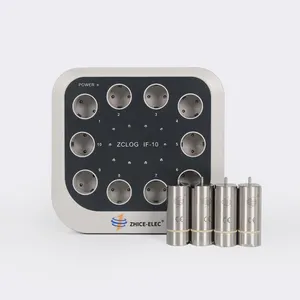

DC12-24V Power Waterproof Temperature And Humidity Sensor Temperature Data Logger And Humidity Sensor


High Precision Steam Sterilization Pharmaceutical Autoclave Wireless Temperature Humidity Data Logger With Monitor System






Data loggers are essential tools for recording environmental parameters over time. They are commonly used in a variety of settings, from scientific research to industrial monitoring. A data logger typically consists of a digital processor, a robust sensor array, and storage for data collection. These devices can be deployed in remote locations or used in controlled environments to gather valuable data on temperature, humidity, and other variables.
The versatility of data loggers is reflected in their various types. A temperature data logger is specifically designed to record temperature data over a period of time, making it ideal for climate-controlled environments. For more comprehensive monitoring, a temperature and humidity data logger captures both temperature and moisture levels in the air. In scenarios where humidity plays a critical role, such as in a greenhouse or storage facility, a temp and humidity logger is invaluable for maintaining optimal conditions.
Temperature dataloggers have a wide range of applications. In the food and beverage industry, they ensure that products are stored and transported within safe temperature ranges. Environmental scientists use temp loggers to study climate patterns, while in the pharmaceutical sector, they are crucial for validating storage conditions of temperature-sensitive medicines. The adaptability of these devices means they can be tailored to the specific needs of any project or industry.
Modern data loggers come with features that enhance their functionality and user-friendliness. Devices like the easylog offer plug-and-play convenience, while systems such as the testo saveris 2 provide wireless monitoring with real-time data access. The primary advantage of using a temp humidity data logger is the ability to make informed decisions based on precise and reliable data, leading to improved product quality, regulatory compliance, and operational efficiency.
The construction of data loggers is designed to withstand the environments they monitor. A temperature logger intended for outdoor use, for example, will typically have a weather-resistant casing. Internal components are often made from durable materials that resist corrosion and wear, ensuring longevity and consistent performance.
Choosing the correct data logger depends on the specific requirements of the task at hand. Factors to consider include the range of measurement, the accuracy needed, and the duration of data collection. For those monitoring both temperature and moisture, a temperature humidity logger is a comprehensive tool that can provide a complete overview of environmental conditions. With the vast array of dataloggers available, finding the right fit for your measurement needs is simpler than ever.